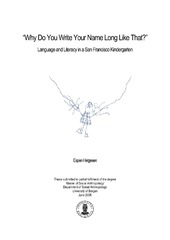| dc.description.abstract | In this thesis I investigate the role of language awareness in early literacy, and argue that skills acquired when becoming literate can provide resources for manipulating social as well as textual relations. Based on ethnographic research among a group of 5- and 6-year old kindergartners in a San Francisco public school, I describe how the kids' personal names provided them with stable landmarks with which to explore both oral and written language. The capacity of names to facilitate communication was, however, countered by the equally powerful capacity of names to obstruct communication. Presenting the kids' personal names as examples of how language is often polysemic, or ambiguous, I argue that, even if the words they used did not have a singular meaning, they were often treated as if they did.I argue that there was a mismatch between two dominant perspectives on names among the kindergartners. Whereas some of the kids primarily used names as markers of identity, others challenged this stability by manipulating names in what I refer to as name joking; the playful manipulation of phonemes or letters for humorous effect. The assumed fixity of names seemed to make them particularly suitable for joking purposes, and a tension could often be found between the kids who considered names to be attached to individuals, and those who considered names to be detached or detachable from individuals.I argue that metalinguistic awareness, understood as the ability to attend to elements of language as objects, was a prerequisite for name joking. Rather than emphasizing this single skill, however, I argue that the kids' different perspectives on language was the product of a difference in communicative flexibility. As such, the kids who were able to switch between considering names to be attached and to be detached from people had a distinct advantage both in conversation and play among the kindergartners. Although teachers encouraged the kids to consider language to be a fluid and flexible tool, they also treated language as a direct reflection of reality by responding with sanctions when the kids used what was referred to as bad words". | en_US |
